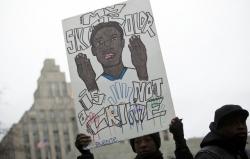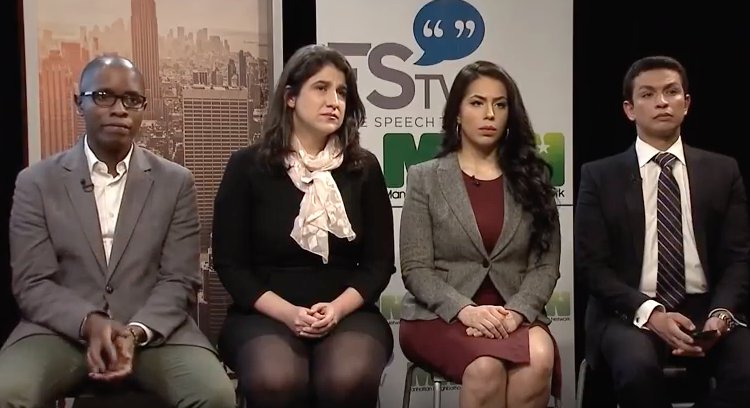This is CCR's weekly "Frontlines of Justice" news round-up, keeping you in the loop about what we've been up to and what's coming soon. Check it out every Monday, your one-stop-shop for CCR opinions, news coverage, reports from court appearances, upcoming events, and more!
CCR at the U.S. Civil Rights Commission

Sign from stop-and-frisk protest: "My skin color is not a crime."
Senior Staff Attorney Darius Charney, the lead attorney in CCR's historic stop-and-frisk case, will be testifying before the U.S. Civil Rights Commission tomorrow. You can watch the hearing, which begins today at 9 a.m. and continues into tomorrow, via livestream. The focus of Darius's testimony is on issues of police accountability, oversight, and discipline. The last time the commission held a hearing on the NYPD was in the aftermath of the shooting death of Amadou Diallo. In 1999, the unarmed 23-year-old immigrant from Guinea was shot 41 times by police while standing in the doorway of his own apartment; the four officers were acquitted in a subsequent trial.
It was the Diallo murder that set in motion the chain of events that eventually led to the landmark ruling in the stop-and-frisk case, Floyd v. City of New York, and the ongoing remedial process stemming from it. CCR filed Daniels v. City of New York in response to the 1999 shooting, which led to a settlement in 2003 that included, among other things, the disbanding of the infamous Street Crime Unit that had been responsible for Diallo's death. Other terms of the settlement were not honored by the NYPD, and the Floyd case was filed in response in 2008.
The 2013 ruling in Floyd, in which the court found the NYPD's stop-and-frisk program to be racially discriminatory as well as an infringement on New Yorkers' rights against unreasonable search and seizure, started a multipronged remedial process. This included numerous reforms ordered by the court, on matters like training and policies related to street stops; a joint remedial process that sought direct input from affected communities; and a pilot body-worn-cameras project. The remedial process is ongoing.
Still a Muslim ban, still unconstitutional
Last Wednesday, hours before Trump's second attempt at a Muslim ban was set to go into effect, a federal court in Hawaii granted a nationwide temporary restraining order against it. CCR was on the airwaves, helping underscore the significance of the court order. CCR’s Noor Zafar on The Real News called the ruling "a significant blow" to Trump's efforts and said "the courts are seeing through the national security pretext" and "seeing the blatant anti-Muslim animus behind the ban." On MSNBC's The Last Word with Lawrence O'Donnell, Vince Warren countered Trump's assertion that he has the power to control immigration, saying, "It's the power of the executive, not the power of the despot or the king. There’s a lot of authority that the president has, but one of the things he can't do is discriminate."
Standing up and defending immigrant communities
Immigrant communities are facing a crisis that can’t be solved in the courtrooms alone.
Bertha Justice Institute Fellow Stephanie Llanes, third from left, on the Free Speech TV immigration town hall.
That’s why CCR has joined our allies in a multipronged effort of advocacy, protest, and on-the-ground support. We’re fighting back against the detentions and deportations that shatter immigrant lives and families, as well as non-immigrant communities of color, and demanding the right of immigrants to safely remain with their families and within our cities and towns.
Earlier this month, Bertha Justice Institute fellow Stephanie Llanes took part in a live town hall panel titled “What’s at Stake: Immigration,” which aired on Free Speech TV and featured discussion of the implications of the Trump administration’s anti-Latinx, anti-Black, and anti-Muslim immigration policies, analyzed why we must expand New York City’s sanctuary policies, and provided insight into how the public can prepare. Watch the entire town hall online.
CCR has partnered with the Immigration Defense Project (IDP) and the Creating Law Enforcement Accountability & Responsibility (CLEAR) project to offer a train-the-trainer workshop on March 29, for individuals giving trainings to clients or community members who are seeking advice for what to do in the event of ICE raids, interactions with law enforcement, or questioning at airports. This workshop will help equip people on the ground with the tools to help their clients, community members, and others invoke their rights and protect themselves. Registration is required, and it’s possible to attend in person here in NYC or streaming online.
As part of our ongoing collaboration with IDP, we have also helped produce a two-page Know Your Rights flyer and poster in 14 different languages, which are available for download here. Print them out, hang them up in your neighborhood, and help increase awareness. Earlier this year IDP and CCR also published a toolkit to help immigrant communities protect themselves and to resist the immigration authorities’ destruction of communities and families.


